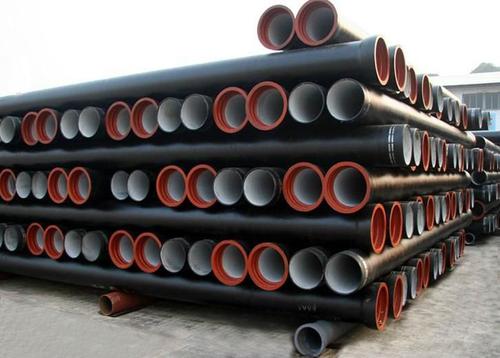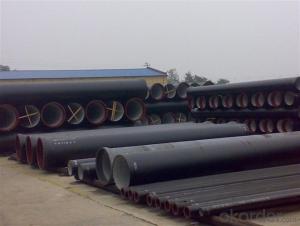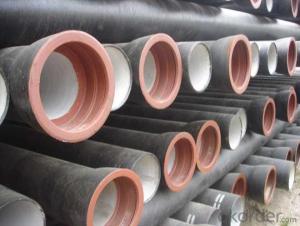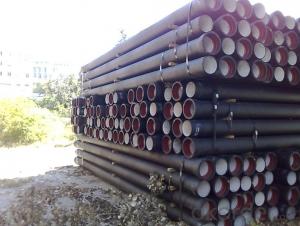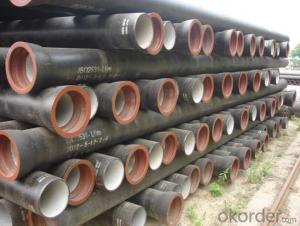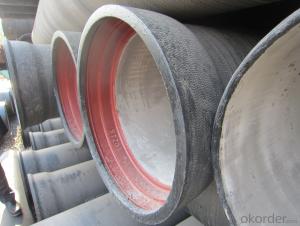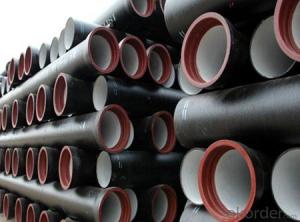Ductile Iron Pipes of China on Chip Price DN400 EN545/EN598/ISO2531
- Loading Port:
- China main port
- Payment Terms:
- TT or LC
- Min Order Qty:
- 21 m.t.
- Supply Capability:
- 200000 m.t./month
OKorder Service Pledge
OKorder Financial Service
You Might Also Like
1. Ductile Iron Pipe Description :
spraying(130g/m2) and bitumen coating(70μm) conform to ISO8179.
2) Pipe ends: Spigot and socket ends, with 100% SBR rubber gaskets accoding to ISO4633
3) we can do third party inspection according to customer's request.
4) Our products have been sold to many international market, such as Middle East and South East Asia and Africa.
2. Main Features of the Ductile Iron Pipe:
1).Quality guarantee
• Chemical checking
• NDE after rough machining
• Mechanical testing after heat treatment
• Final NDE,dimension inspected
2).Quality document
• Full Q.A document as per client request
3).Packing and Shipping
• standard export package(carton/wooden case/pallet)
• accept FOB,FAS,CNF,CIF door to door etc or customer designated shipping agent
4).Service
• Drawing: we can translate your original drawing, offer best suggestion on design
• Quality: we have full set quality control system to guarantee the best quality.
• Inspection: inspect in house, all our products must be checked 3 times before packing
5) Our goal
• To be your preferred partner
3. Ductile Iron Pipe Images:
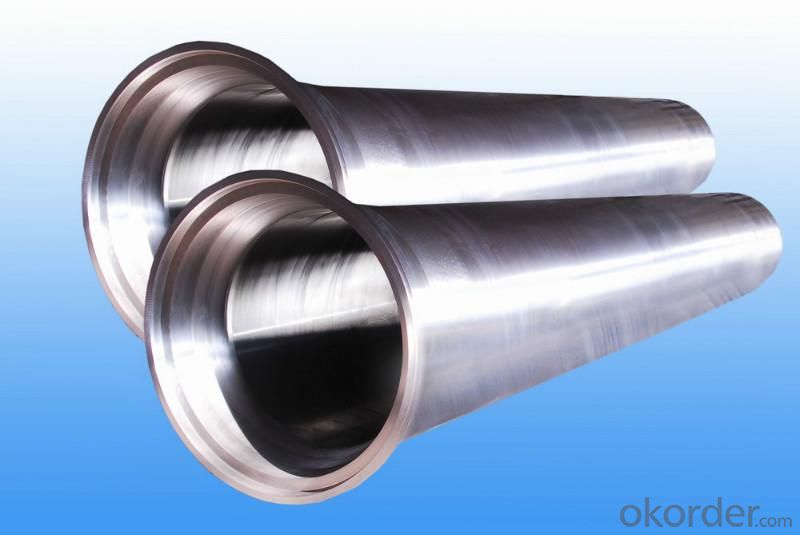
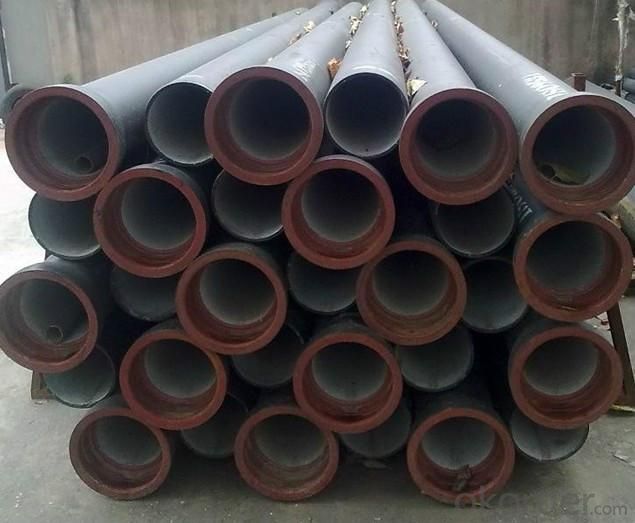
4. Ductile Iron Pipe Specification:
Surface Finishes: Bare, Oiled, Mill Varnish, Galv,FBE, FBE Dual, 3LPE, 3LPP, Coal Tar,Concrete Coating and Tape Wrap
End Finishes: Beveled, Square Cut, Threaded, hat
Additional Services: Internal Coating
Inspection: MOODY SGS BV GL DNV ABS LIOYD’S
Test: X-ray, UT, magnetic particle,inspection,hydrostatic test.
Processing service: Beveling, Threading, Slotting, Cut-to length, Bends, Quench and Temper, Fabrication, Double-jointing and On-site assistance
Documentary: MTC, material certification,Origin certification, CI or PI,Test Report, export licence, handling order, B/L,insurance policy,shipping instructions, contract, packing list etc.
Gasket: 100% SBR/NBR/EPDM rubber gasket in accordance with ISO4633.
Packing: ductile iron pipes from DN100 to DN300 be bundled with steel belts, others are in bulk.
Payment term: L/C, T/T.
5.FAQ:
We have organized several common questions for our clients,may help you sincerely:
1.Q: Why would you choose ductile iron pipe rather than other pipe materials?
A:The reasons are obvious for that not only ductile iron pipe possesses the inherent strength and flexibility of ductile
iron, combined with proven corrosion protection systems, but also the cost savings can be achieved from design to
installation and commissioning.
2.Q:Why can you guarantee the inner of pipes can’t be corroded?
A: High alumina cement mortar lining and sulphate-resistant cement mortar lining. These two special linings are applicable
to inner anti-corrosion for sewage pipes, improving resistance to erosion of the sewage components.
- Q: How does ductile iron pipe handle soil movements and settlements?
- Ductile iron pipe has gained a reputation for effectively managing soil movements and settlements. Its ability to accommodate ground shifts and settling without compromising its structural integrity is attributed to its flexibility and durability. A notable characteristic of ductile iron pipe lies in its inherent strength and resilience. It can endure external pressures and stress caused by soil movements, including lateral forces and ground settlement. This is due to its high tensile strength, which enables it to resist deformation and maintain its shape even under substantial loads. Furthermore, the flexibility of ductile iron pipe plays a crucial role in its capacity to handle soil movements. The pipe's natural flexibility allows it to absorb the impacts of ground shifts and movements without fracturing or breaking. It can bend and adjust to changes in the surrounding soil, minimizing the risk of pipe failure or leakage. Additionally, the joint design of ductile iron pipe contributes to its effectiveness in managing soil movements and settlements. The installation employs a push-on joint system that permits some movement and settlement without compromising the overall integrity of the pipeline. The joints can absorb and distribute stress and movement, minimizing the risk of pipe failure. In conclusion, ductile iron pipe excels in managing soil movements and settlements. Its strength, flexibility, and joint design enable it to withstand external pressures resulting from ground shifts, settling, and other soil movements. As a result, ductile iron pipe is a reliable choice for a range of applications where soil movement is a concern.
- Q: Can ductile iron pipe be used for directional drilling?
- Yes, ductile iron pipe can be used for directional drilling. It is a strong and durable material that can withstand the stresses and forces encountered during directional drilling operations. Its flexibility and resistance to damage make it a suitable choice for this application.
- Q: What is the difference between ductile iron pipes and cast iron pipes?
- Ductile iron pipes and cast iron pipes have different compositions, properties, manufacturing processes, and applications. Ductile iron pipes are made from a type of cast iron known as ductile iron, which contains higher levels of carbon, silicon, and other alloying elements like magnesium. On the other hand, cast iron pipes are made from regular cast iron, which has a higher carbon content and lower levels of alloying elements. In terms of properties, ductile iron pipes are recognized for their high tensile strength, flexibility, and durability. They can withstand higher pressure and have a greater resistance to impact, making them suitable for applications that demand robust performance. Conversely, cast iron pipes are more brittle and fragile, making them susceptible to cracking or breaking under pressure or impact. The manufacturing process differs as well. Ductile iron pipes are formed through centrifugal casting, in which molten ductile iron is poured into a spinning mold. This centrifugal force aids in the even distribution of the molten metal, resulting in a strong and uniform pipe. On the other hand, cast iron pipes are made using sand casting, where molten cast iron is poured into a mold made of compacted sand. This method is less precise and can result in variations in the final product. In terms of applications, ductile iron pipes are commonly used in water and sewage systems, as well as in industrial pipelines that require high-pressure resistance. Cast iron pipes, on the other hand, are typically used in non-pressure applications such as drainage systems or underground sewer lines. To summarize, ductile iron pipes and cast iron pipes differ in their composition, properties, manufacturing processes, and applications. Ductile iron pipes offer greater strength, flexibility, and durability, making them suitable for high-pressure applications, while cast iron pipes are more brittle and commonly used in non-pressure applications.
- Q: Can ductile iron pipes be installed outdoors?
- Ductile iron pipe is a kind of cast iron. It is an alloy of iron, carbon and silicon.
- Q: How long does the cast iron pipe of indoor direct buried sewage need to be examined?
- UPVC, also called hard PVC, is an amorphous thermoplastic resin made by polymerization of vinyl chloride monomer, with certain additives (such as stabilizers, lubricants, fillers, etc.). In addition to additives, the method of blending with other resins is also applied to make it have obvious practical value. These resins are CPVC, PE, ABS, EVA, MBS and so on. UPVC has high melt viscosity and poor flowability. Even if the pressure and melt temperature are increased, the fluidity is not changed. In addition, the molding temperature of the resin is very close to the thermal decomposition temperature, and the molding temperature range is very narrow. It is a difficult material to be formed.
- Q: What is the typical lifespan of ductile iron pipe?
- The lifespan of ductile iron pipe can differ based on several factors, including the pipe's quality, the conditions it faces, and the maintenance practices employed. On average, ductile iron pipe typically lasts about 100 years. This longevity is a result of its inherent strength and durability, allowing it to withstand high pressure and various environmental conditions. Furthermore, ductile iron pipe is often coated with protective materials like cement mortar lining or polyethylene encasement, which further enhance its durability. Regular inspections and maintenance can also contribute to extending the lifespan of ductile iron pipe by promptly identifying and addressing any issues or potential damages.
- Q: How does ductile iron pipe perform in areas with high soil consolidation?
- Ductile iron pipe performs exceptionally well in areas with high soil consolidation. The inherent strength and flexibility of ductile iron make it a suitable choice for underground installations where the soil tends to consolidate, or settle, over time. In areas with high soil consolidation, the ground often experiences significant movement and settling, which can pose challenges for buried infrastructure. However, ductile iron pipe's unique characteristics enable it to withstand these conditions. Firstly, ductile iron has a high tensile strength, which means it can resist external forces and pressures exerted by the surrounding soil. This strength allows the pipe to maintain its structural integrity even in areas with high soil consolidation. Secondly, ductile iron is highly resistant to deformation and can handle ground movement without cracking or breaking. The pipe's flexibility allows it to absorb the lateral forces associated with soil consolidation and prevents it from being damaged. Additionally, ductile iron pipe is known for its durability and long service life. It is resistant to corrosion, abrasion, and chemical attacks, further enhancing its performance in areas with high soil consolidation. This resistance ensures that the pipe remains intact and functional, even in challenging soil conditions. Moreover, ductile iron pipe's joints are designed to provide a secure and leak-free connection. This eliminates the risk of soil infiltration, which can potentially worsen soil consolidation and lead to further ground movement. In summary, ductile iron pipe performs exceptionally well in areas with high soil consolidation due to its strength, flexibility, durability, and leak-free joints. Its ability to withstand ground movement and maintain its structural integrity makes it a reliable option for underground installations in such conditions.
- Q: What are the different joint types available for ductile iron pipes?
- Ductile iron pipes offer various joint types that are essential for maintaining the integrity and reliability of the pipeline system. 1. The push-on joint is the most prevalent joint used for ductile iron pipes. It involves inserting a rubber gasket into the bell end of the pipe and then pushing the spigot end into the bell, ensuring a tight seal. This joint is easy to assemble, quick, and has excellent resistance against soil movement and water pressure. 2. The mechanical joint involves a gland and follower that are secured around the spigot end of the pipe using bolts and nuts. It provides a robust and durable connection and is commonly used for larger diameter pipes or applications that expect higher pressure or thrust loads. 3. Flanged joints are utilized when connecting pipes to other components like valves or fittings. The pipe ends are machined and equipped with flanges that are bolted together using gaskets, ensuring a secure connection. These joints find frequent use in industrial applications or situations requiring frequent disassembly. 4. Restrained joints are designed to withstand significant external forces and prevent separation or pulling apart of the pipe. They typically combine mechanical joint components, such as bolts and glands, with additional restraining elements like welded or bolted-on restraints. These joints are commonly employed in high-pressure applications or situations where substantial external forces are present. Choosing the appropriate joint type is crucial and depends on factors such as pipeline design, operating conditions, and installation requirements. Seeking guidance from experienced engineers or pipe manufacturers can aid in determining the most suitable joint type for a specific ductile iron pipe application.
- Q: Can ductile iron pipe be used for cooling water systems?
- Yes, ductile iron pipe can be used for cooling water systems. Ductile iron pipes are known for their high strength and durability, making them suitable for various applications, including cooling water systems. They have excellent resistance to corrosion, which is important in preventing damage and maintaining the efficiency of the cooling water system. Additionally, ductile iron pipes can handle high-pressure and high-temperature conditions, making them a reliable choice for this purpose.
- Q: Are ductile iron pipes resistant to environmental stress cracking?
- Yes, ductile iron pipes are highly resistant to environmental stress cracking.
Send your message to us
Ductile Iron Pipes of China on Chip Price DN400 EN545/EN598/ISO2531
- Loading Port:
- China main port
- Payment Terms:
- TT or LC
- Min Order Qty:
- 21 m.t.
- Supply Capability:
- 200000 m.t./month
OKorder Service Pledge
OKorder Financial Service
Similar products
Hot products
Hot Searches
Related keywords



